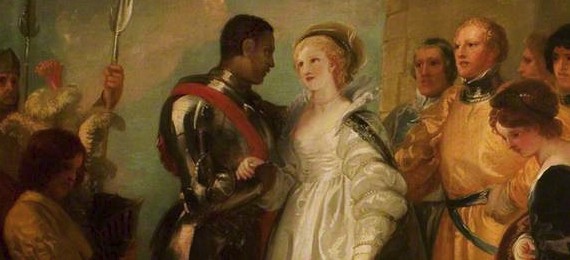Analyzing the famous line from Othello

There are lines in multiple Shakespeare plays about jealousy being green, but it?s in Othello that he made the description famous.
The passage in Othello about the green-eyed monster is remembered not only because it?s such a marvelously vivid and poetic description, but because, in its context, it?s a brutally effective manipulation.
Iago is telling Othello to guard against his own jealousy, even as we know he is doing all he can to feed it.
O beware my lord of jealousy.

Iago?s famous line about jealousy is a poetic truth spoken to the audience. It is also a narrative element. He is moving the plot forward by manipulating Othello, whom Iago knows will only grow more jealous when he?s told to be wary of the feeling.
The line is also foreshadowing where the tragedy is headed.
It is the green-eyed monster which doth mock the meat it feeds on.

By the time Iago feeds us this line, he?s already told us the details of his plan to take Othello down. He?s even told us how he?s going to do it!
He?s going to make Othello insane with jealousy, and all the while, he?s going to convince Othello that amidst all the intrigue and betrayal playing out around him, he can always trust his loyal friend Iago.
A friend so loyal he warns him to be mindful of his own emotions.
O beware my lord of jealousy.

The line is beautiful because it is true. It is ironic because it is a true statement delivered under entirely false pretenses. It heightens the dramatic irony at work in the play, making the audience co-conspirators in Iago?s schemes.
If the audience had any doubt about the nature of what Iago was up to, it is with this line that all doubt must be dropped. By this point in the play, it?s clear that all the action is being manipulated by Iago, that he is the only character who knows the full truth of what?s happening, and that the other characters are lost and confused amidst the barrage of lies he?s unleashing upon them.

The audience is both sympathetic to the title character, and also part of the plot against him. They get to enjoy the salaciousness of what Iago is doing, their minds provoked as they decipher multiple layers of truth and lies.
As they watch one of literature?s most devious and expert manipulators at work.
I read this line from Shakespeare and I think of how the best manipulators play all sides of the lie. I think of Hitler lying to England and France in the Munich Agreement, and also lying to his own nation when he staged a fake Polish invasion. I think of American presidents from Truman through Nixon lying about the scale and activities of the Vietnam War, each for their own political interests, political interests that, from one president to another, played to different interest groups and ideological opposites.
I think of Henry VIII manipulating the course of history with lies meant to dispose of wives he grew to find inconvenient. I think about the Kremlin feeding the outrage of American voters on all sides, using botnets and paid trolls to amplify lies from both left and right, the manipulators not interested so much in pushing any one lie in particular as in pushing all of them at once.
Shakespeare understood that an effective liar, one who is willing to wallow in depths of untruth that would make most of us too uncomfortable to function, can destroy the trust that allows for social cohesion in any group.
With Iago, Shakespeare showed us how one motivated liar can have tremendous power, simply because of the destructive force of his lies.

This, I think, is what Shakespeare?s brilliance is all about. A single sentence that accomplishes more than entire pages would in the hands of lesser authors.
A sentence packed so full of meaning we remember it, study it, and revere it, centuries later.
?O beware, my lord, of jealousy;It is the green-eyed monster which doth mock the meat it feeds on.?



